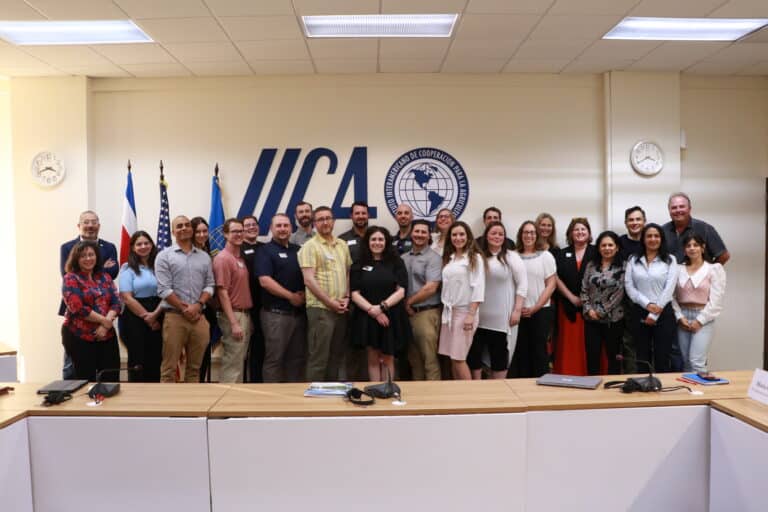More than 20 negotiators from 17 countries in the region participated in a workshop to coordinate perspectives on agriculture’s ability to provide climate change solutions, as part of preparations for COP 27 at the end of this year.
San Jose, 27 April 2022 (IICA) – Agriculture sector representatives from 17 countries in the Americas shared perspectives on actions the sector should take and how it should position itself in international climate change negotiations in preparation for the Conference of the Parties 27 (COP 27) of the United Nations Framework Convention on Climate Change (UNFCCC), to be held in Egypt in November.
The 25 representatives attended a workshop organized by the Inter-American Institute for Cooperation on Agriculture (IICA), the Food and Agriculture Organization of the United Nations (FAO), the Executive Secretariat of the Central American Agricultural Council (SECAC) and the Latin American and Caribbean Platform for Climate Action in Agriculture (PLACA).
The negotiators were representing Argentina, The Bahamas, Brazil, Canada, Chile, Costa Rica, Dominica, Dominican Republic, El Salvador, Ecuador, Guatemala, Mexico, Panama, Paraguay, Peru, United States of America and Uruguay.
The Minister of Agriculture and Livestock of Costa Rica, Renato Alvarado; the Deputy Director of IICA, Lloyd Day; and the Executive Secretary of the CAC, Lucrecia Rodríguez, spoke at the opening of the workshop.
Alvarado maintained that, “When you are negotiating about the world’s resources for environmental protection remember that you are negotiating the lives of human beings who are out in the fields every day, hoping for support to forge ahead and to maintain a profitable business, because people in the countryside have dignity and deserve to be considered by those of us with opportunities and the power to direct and change the course of history”.
The workshop was held at IICA Headquarters in Costa Rica, and its main area of focus was the Koronivia Joint Work on Agriculture (KJWA), an initiative launched at COP 2017 that recognizes agriculture’s particular vulnerability to climate change and threats to food security.
This process addresses topics related to soils, nutrient use, water, livestock production, adaptation assessment methods, as well as the socioeconomic and food security dimensions of climate change in agriculture.
Lloyd Day urged the participating agricultural negotiators from the 17 countries of the Americas to arrive at a consensus and to ensure that, at international forums like COP 27, they highlight the critical role of agriculture as part of the solution to climate challenges, as well as its relevance and progress in transitioning towards more inclusive, resilient and sustainable agrifood systems.
The IICA Deputy Director General remarked that, “Agriculture of the Americas will have an important seat at the climate negotiations table with the leaders of the world. Let us arrive at a consensus within the hemisphere and with other parts of the world facing the same challenges. Up to this point, agriculture had been viewed as a problem in the climate change arena, but we are part of the solution. We must create a spirit of solidarity among negotiators and technical experts who are knowledgeable about the issue”.
The Executive Secretary of CAC, Lucrecia Rodríguez, commented that promoting events of this type was critical to developing a clear and unified message about the value of agriculture.
In closing, she reflected that, “We are considering how to strengthen the negotiating teams and people to ensure that they speak with a single voice, a shared vision and the same message about what agriculture represents for food production and more importantly, what we are doing to adapt this activity to climate change and to contribute to its mitigation”.
More information:
Institutional Communication Division.
comunicacion.institucional@iica.int











